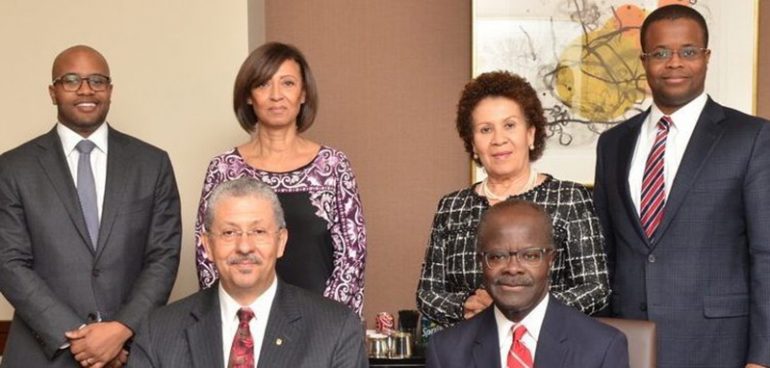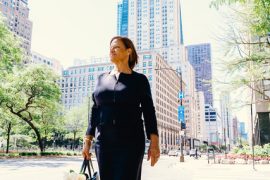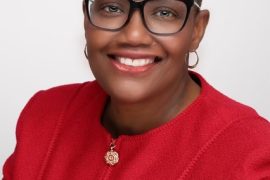Somewhere, Louise Quarles Lawson is beaming.
Last year, the Illinois Service Federal Savings & Loan Association (ISF) that Ms. Lawson turned into an integral powerful icon in Chicago’s Black community for decades was on the verge of shutting its doors.
A federal consent order issued in April 2015 demanded that ISF up its on-hand capital or face “corrective action” which could have included closure and transfer of its deposits and loans to another bank.
ISF, under the direction of then chairman Norman Williams who had been on the board for over 40 years, began an intense mission to save the bank. It was unsure where the money to increase capital would come from and whether finding such an angel investor would ensure that the ISF would remain Black-owned.
Fortunately, it all worked out for the best when back in April, a year after ISF received its consent of doom, Groupe Nduom, a Ghanaian American family-owned multi-national investment firm, acquired the institution.
They changed the name to ISF Bank, infused nine million dollars of capital into it, when only seven million had been initially sought, changed it from a mutual organization to a shareholder-owned company, and have pledged to continue to positively impact and be a leader in the community the bank has long served.
ISF, therefore, remains one of only two Black-owned banks left in Chicago and among the 20 or so left in the United States after there were 64 just 30 years ago.
A Long Storied History
For many young Black adults in Chicago, if ISF is not currently their bank, chances are it was their parents and most likely was their grandparents and even great-grandparents bank. ISF was in and of the community even long before Independence and Seaway Banks were established on the South Side in the 1960s and became the largest Black banks in the nation.
The story began in the early 1930s, when Blacks from the South who had settled in Chicago via the Great Migration found it difficult to do business with the White banks in the city and all but impossible for people of color to obtain mortgage loans.
Thirteen African-American businessmen and their supporters had a dream to establish a savings and loan association sensitive to the needs of Black residents of Chicago.
In 1934, the group formed Illinois Service Federal as a depositor-owned lender and the doors opened to a one-room office at 70 East 47th Street with deposits of $7,000. The first few depositors had balances ranging from $4 to $50, according to the company’s history.

But from its main office at 4619 South King Drive and a branch at 87th and King Drive that opened in 2000, as the bank’s assets grew, so did its ability to help local Black communities grow and prosper. Before Groupe Nduom rescued the bank, ISF was serving more than 14,000 customers and had assets of more than $100 million and 38 employees.
Louise Quarles Lawson, who spent 57 years with the bank, spearheaded that achievement. She joined it as a clerk in 1946 and became its president in 1976. As such, she became the first Black woman to head a savings and loan in America. Lawson remained with ISF until a year before she died in 2004 at the age of 87.
But it was under her tenure that ISF became a lion for the community. “The bank always encouraged African-Americans to buy their homes. We were giving loans to first-time homeowners of the inner city,” says former board chairman Williams. “Louise Lawson always felt that we were responsible for the wealth of the community, that we were responsible for the community’s heritage.”
Not So Wonderful Life
While part of ISF’s charm was that it operated like a small mom-and-pop thrift, as in the Bailey Building and Loan from the movie It’s A Wonderful Life, that was also part of the reason it got into trouble.
It functioned in 2014 much like it did in 1934 – giving mortgages to homeowners, churches and non-profits and giving them the benefit of the doubt when they couldn’t meet their loan payments.
According to the FDIC, at the time of the federal consent order against ISF, about $30 million of its $50 million in loans were home loans and almost 14 percent of the mortgages were seriously delinquent – more than 90 days behind in payment. In comparison, most banks don’t let that “seriously delinquent” figure get much higher than one percent.
Like most minority lending institutions, the 2008 recession hit ISF particularly hard, with the high levels of unemployment and home foreclosures it wrought. There was just no money for its customers to pay ISF back on their loans.
As a result, in the three years that ended in 2014, Illinois Service Federal had nearly nine million dollars in losses, which depleted nearly two-thirds of its capital and put it on the brink of collapse.
A Mutual Attraction
While ISF was looking for a guardian like Clarence, George Bailey’s angel in A Wonderful Life, the Nduom family was looking into getting into the financial industry in America.
Papa Kwesi Nduom, 63, and his wife Yvonne, both of whom were born in Elmina, Ghana, head the group. They both attended the University of Wisconsin where he earned a bachelor’s degree in economics, a master’s in business management and a PhD in delivery systems and she got her master’s degree in education administration and supervision.
 Both came from modest means and worked their way through school, with Dr. Nduom holding jobs at a meat factory, parking lot, a cannery and an internship with Northwestern Mutual Life Insurance, all in Milwaukee.
Both came from modest means and worked their way through school, with Dr. Nduom holding jobs at a meat factory, parking lot, a cannery and an internship with Northwestern Mutual Life Insurance, all in Milwaukee.
In 1981, he got a referral to the financial services firm of Deloitte & Touche (DT), where he rose through the ranks and became a partner in 1986, one of five Blacks out of over 1,000 partners at the firm that year. In 1991, Dr. Nduom opened DT’s (first) West Africa consulting office.
In the meantime, Mrs. Ndoum held management positions with Blue Cross Blue Shield and other corporations, and provided management training services to companies such as Unilever, Nestle and Ghana Airways.
“When dad went to Ghana to start D&T West Africa, he and mom also started a hotel and investment management firm. That really ballooned into about 40 businesses in Ghana and a number of businesses developing in the sub-region,” says son Chiefy, who is the vice president and general counsel of their new ISF Bank.
His brother Kweku is ISF’s vice president for finance and business development. Kweku went to Princeton and got his MBA from the Wharton Business School. Chiefy went to the University of Pennsylvania and got his law degree from Columbia University. Both brothers are in their 30s.
They have a middle brother between them, Edjah, who is a neurosurgeon from Stanford University, and their sister Aba is a psychiatrist from Yale. All the children were born in the States – Kweku and Chiefy in Milwaukee – but were all brought back to Ghana to experience that country’s culture, life and education.
Groupe Ndoum’s business pedigree is as impressive as is the individual family members’. It manages a diverse portfolio of business and social welfare enterprises primarily in West Africa, the United Kingdom and the United States.
With thousands of employees, Groupe Ndoum has managing interests in banks, brokerages, finance companies; media, including TV and radio stations and a newspaper and advertising company; hotels, sports teams, entertainment companies; concrete, automotive, printing, electronics and power companies, as well as a quarry; and schools, learning and development centers and a community library.
The Nduom’s were trying to further diversify financially in America, “but getting into the banking industry here is very hard to do,” says Kweku.

“When we were first looking at coming into the financial services industry here in the U.S., we started talking to advisers trying to get the lay of the land,” says Chiefy. “Most people were saying that it was virtually impossible to get a new license and that the only thing harder to get in the U.S. was a nuclear facility license than a banking license, so the odds were stacked against us.
“The advice was that if we were going to get into it at all, we probably needed to buy a bank, so we were very much into that idea and looked at a lot of different smaller banks all over the United States. Through a mutual friend of my fathers and Norman Williams, this opportunity with ISF presented itself.”
The two sides met and spent about 18 months getting to know each other, according to Chiefy, who says, “It looked like the ideal opportunity for us because this bank has so much history. It played such a huge role back then, but still has a huge role to play in the Black community in Chicago and potentially in the United States in making sure that Black people have access to the same sorts of opportunities and finances that everybody else does.”
Still, Kweku said, “You don’t get a bank just because you have the money to invest. The regulators vet you thoroughly. They go through your history, your character, your integrity, and your capability of managing the investment because you’re investing and managing money that’s insured by the FDIC. So they want to make sure you can manage it right.”
Dr. Nduom will serve as new ISF chairman, sending Norman Williams into a well-earned, overdue retirement, while Kweku and Chiefy will monitor operations, while still overseeing the family’s other business interests. Robert Klamp, the former president of the International Bank of Chicago, will be the new ISF Bank CEO.
Black To The Community
In explaining how Groupe Nduom will run the new ISF Bank, Chiefy notes, “The company focuses on development-oriented businesses. We operate in areas with businesses that both give jobs and also help build up the areas they’re in.”
Of the acquisition, Dr. Ndoum said he is “proud to support this leading institution and trusted Chicago partner which, for eight decades, has worked to revitalize the urban areas in which it operates. Our investment will enable the bank to build upon its legacy by providing a suite of innovative financial services and products to address its customers’ needs. This investment helps ensure that minority focused banks continue to play a vital role in community economic development.”
Believing that this opportunity could represent the beginning of a renaissance in the community because of the role Black banks have played historically in the city of Chicago, Dr. Nduom added, “We look forward to serving and building the South Side in the long tradition of Illinois Service Federal as a prime residential and business community to compliment the proposed President Obama library to be sited there.”
Chiefy interestingly noted that “Our father is very keen on the fact that the story of Black investment and re-investment within the Black community is not being told and is not being promoted as heavily as it was in his time in the 1960s and 70s. There’s less attention paid to it.
“When he was in school, he would spend a lot of time reading Black Enterprise, Ebony and Jet to see who the Black business people were, the rankings, to see what’s going on in the various Black communities. He talks about the work that Elijah Muhammad did in terms of Black empowerment and business and how these things were more top of mind at that time.

“We don’t see now in the people’s popular consciousness this idea that it’s important to have your money in institutions that are owned by people who are like you, that you invest in communities that are similar to ones you’re interested in. I don’t know that it’s generally accepted and believed that Black banking really is as important and impactful as it is.
“It seems very obvious that in Black communities you don’t have a fair shake when it comes to access to credit. It’s very difficult to get a loan or mortgage as a Black person and the idea that if you go to a Black bank, you might be better able as a well-qualified borrower to get a mortgage or a loan – I think that makes sense to everybody.”
Chiefy concluded that his company is trying to look for things that are undervalued and then invest in them and represent their true value. He says that ISF is a classic case here where as a result of history and policies like redlining, there are pockets within the third largest city in America that are technically fantastic areas because they have parks, they’re close to the waterfront, they’re close to downtown.
“So we want to try to take our time to build our business here and reap that value,” Chiefy said. “And we will do smart business and real business, not the quick flip type of stuff. We’re here for the long term to develop strong Black communities with high property values that are thriving, instead of declining.”






